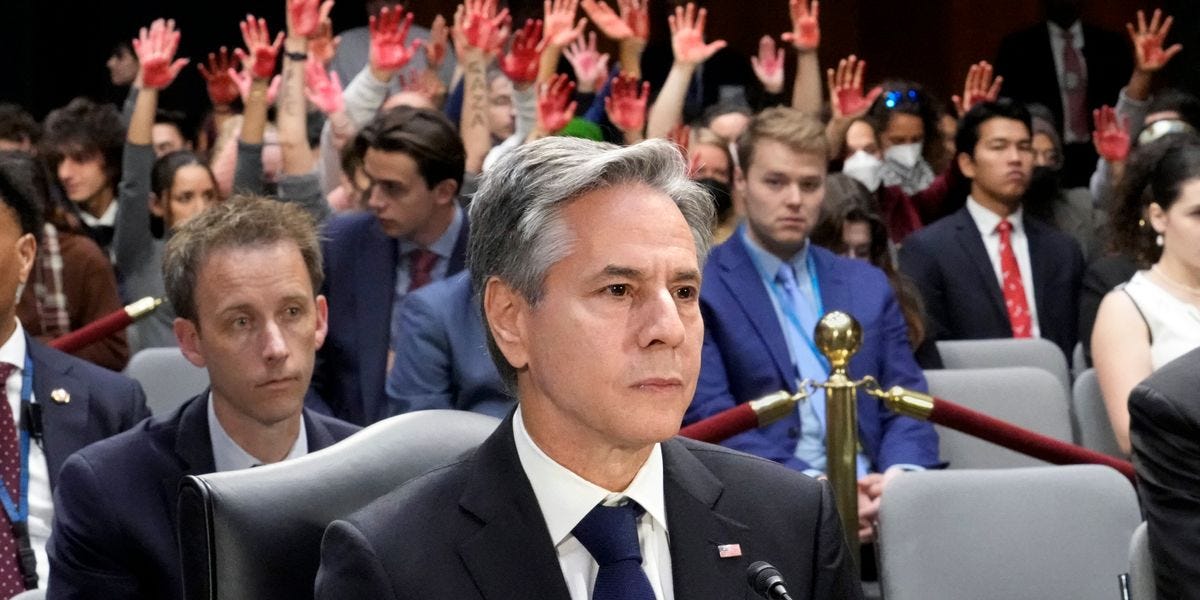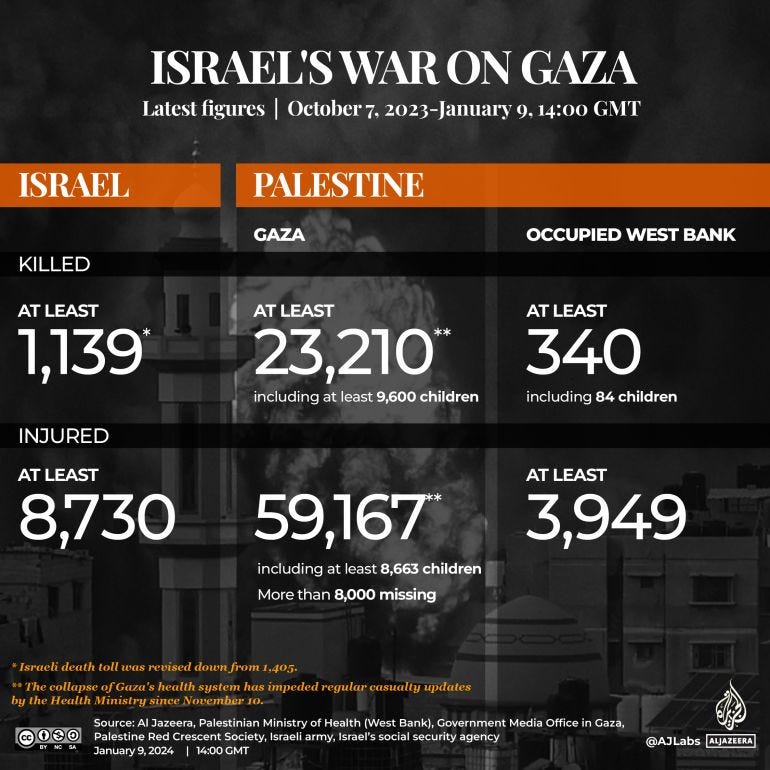The War Racket's Shadow Over Gaza: Unveiling the Ugly Truth Behind US-Israel Complicity
Blinken's Betrayal: Bloodstained Diplomacy and the Hollow Rhetoric of Peace
By: Gerry Nolan
In the shadow of Gaza's decimation, where over 23,000 Palestinians, primarily women and children, lie dead, US Secretary of State Antony Blinken's words (Tuesday), ring hollow. Standing amidst the ruins, he decries the civilian toll as 'far too high,' yet his actions tell a different tale. The US, with Blinken at its helm, continues to fuel Israel's war machine, supplying the very arms that enable this mass murder. This chilling dichotomy of empty rhetoric and lethal action unveils a brutal reality: the US, under the guise of diplomacy, is complicit in a ethnic cleansing it could halt with a single stroke of policy change – a 'radical' change that upholds the sanctity of human life.
As Blinken navigates the Middle East, his platitudes of peace and rejection of permanent displacement in Gaza contrast starkly against the backdrop of ongoing US welfare-warfare payments and arms deliveries to Israel. These weapons are anything but tools of defence but instruments of an appalling onslaught against a besieged population. The US's veto of any meaningful UN Security Council (UNSC) resolution calling for a ceasefire is not just a political maneuver; it's an endorsement of the carnage, a clear signal of where its allegiance lies. This is not about security; it's about perpetuating a war that benefits the few at the cost of tens of thousands of Palestinian lives.
The hypocrisy is glaring when Blinken rejects the accusation of genocide at the International Court of Justice. By dismissing these charges as meritless, the US further entrenches its role as an apologist for war crimes. The US accused ethnic Serbs of committing genocide in Srebrenica, where that acknowledged total, though tragic is a fraction of the 23,000 Palestinians killed since October 7th. By its own precedent, the US opens itself up to the genocide label being aptly used here. What is certain? This is mass murder, these are horrific war crimes. This stance is a betrayal not only of Palestinian lives but also of the very principles of human rights and justice the US purports to champion. It's a grim reminder that for some, war is a lucrative business, with companies like Raytheon and General Dynamics profiting from the endless cycle of violence. For the US, there seems to be only money to be made from the suffering that stems from the countless women and children brutally murdered by the war machine it provides to its glorified forward operating bases, be it in Ukraine or Israel. Palestinians and innocent Slavs are seemingly not considered the 'chosen ones' in the US's 'rules-based' lottery, where lives deemed worthy of saving are selectively picked.
In a striking display of this duplicity, the US has continued to supply arms to Israel, even following incidents where these weapons have been used in apparent war crimes. For instance, during the May 2021 hostilities in Gaza, the Israeli military bombed a high-rise building housing international media organizations, a clear violation of international humanitarian law. Yet, in the wake of this, the US authorized an additional $735 million in arms sales of precision-guided weapons to Israel. Similarly, despite the US's pronouncement to ending certain arms sales to Saudi Arabia and the UAE due to their conduct in the Yemen war, it approved a $500 million military support deal for Saudi Arabia, ignoring the coalition's numerous violations of the laws of war, including significant harm to Yemeni civilians.
Compounding this hypocrisy, Wall Street has eyed big profits from conflicts such as the war in Gaza. Financial analysts have openly discussed the financial benefits of the genocide of Gaza under the pretext of the "Hamas-Israel war" , with a focus on the boon to the aerospace and weapons sector. The stark and callous calculations of profit from human suffering starkly contrast with corporate "statements on human rights" that purportedly endorse the Universal Declaration of Human Rights and UN Guiding Principles on Business and Human Rights. This blatant profiteering on war, while ignoring the human rights implications, underscores the deep-rooted moral conflicts in the financial and political support systems underpinning these conflicts.
In this bleak landscape, where regional tensions simmer and the spectre of a wider conflict looms, Blinken's words are but a whisper against the roar of bombs and the silent screams of the fallen. This war, sustained by US arms and diplomatic cover, stands as a stark testament to the world's failure to protect the vulnerable. It starkly reveals the diminishing veneer of moral authority that once cloaked US hegemonic global leadership. The pressing question remains: How many more lives will be sacrificed at the altar of exceptionalism and corporate greed? The blood of Gaza, it seems, is the price of this unholy alliance.
This narrative extends beyond mere political alliances; it reveals the underlying war racket that drives global conflict. The military-media-industrial complex, with its insatiable appetite for profit, finds fertile ground in the ravaged landscapes of Gaza. The arms supplied by the US to Israel are not just weapons of war; they are the lifeblood of a lucrative business model that thrives on human suffering. The devastation in Gaza is not an unfortunate byproduct but a necessary condition for this profit-driven machinery.
The role of the US in this equation is pivotal. Without American support, Israel would struggle to sustain its military operations on such a scale and would in fact be forced to peacefully coexist and sew for peace. This support is not a passive gesture; it is an active and strategic choice that aligns with the broader objectives of US foreign policy, that of glorified forward operating bases. Israel, much like Ukraine in its war with Russia, is used as the tip of the spear, a proxy in a larger game of geopolitical chess where human lives are expendable pawns.
In the shadow of strategic alliances and cynical geopolitical maneuverings, the US-Israel relationship stands as a paradigm of complexity, codependency and contradiction. This relationship, deeply rooted in 20th century history, is a testament to the intricate interplay of military might, economic prowess, and cynical calculus. Dr. Stephen Zunes, paints a vivid picture of the US's foreign aid to Israel, highlighting its uniqueness both in terms of magnitude and nature.
The sheer scale of the aid – totalling a staggering $124 billion through fiscal year 2023 – marks it as the most substantial foreign-aid program in history between two countries (given how small Israel is)- . Significantly, this aid began to escalate notably after the 1967 War, transitioning from loans to grants (a sort of warfare-welfare) and reflecting a deepening commitment that transcends traditional donor-recipient dynamics. This financial warfare-welfare, funnelled directly into Israel’s government treasury, underscores a relationship of mutual (malignant) dependence and strategic alignment, far removed from the usual strings-attached aid given to other nations.
Moreover, the US's approach to Israel is characterized by a notable exceptionality. Unlike other recipients of American ‘generosity’, Israel enjoys the privilege of receiving aid in lump-sum payments, an arrangement that effectively provides it with financial leverage over the U.S. itself, as it can invest this money back into U.S. treasury bills. The relationship further extends into private realms, with American tax-deductible contributions and bond purchases swelling the flow of funds to Israel. This financial dynamic is not just a mere transactional exchange but a robust endorsement of Israel's geopolitical and economic stance, cementing its position as a once pivotal player in regional and global affairs.
The roots of this policy extend beyond mere financial aid. They are entwined with the strategic interests of the United States, where Israel has emerged as a crucial forward operating base in a volatile (by its own making) region. Its role in serving as a bulwark against perceived American threats has been pivotal. The alliance has a massive military dimensions too, with Israel providing a testing ground for American arms and acting as a conduit for U.S. arms to regimes and armed groups otherwise challenging to support openly.
The Clinton administration further bolstered this relationship, viewing Israel not just as a beneficiary/dependent but as a strategic partner, integral to the broader objectives of U.S. foreign policy. This approach has resulted in a paradox: Israel, with its significant gifted economic and military capabilities, continues to receive aid at levels that seem disproportionate to its actual needs. It raises critical questions about the interplay of aid, military dependency, and the broader objectives of U.S. foreign policy in a world on the brink due to such dangerous and cynical policy.
This alliance, while short-sightedly serving immediate geopolitical interests, has broader implications and dangers. It shapes the regional tensions in the Middle East, influences (prevents) the peace process, and impacts the socio-economic fabric of both nations. As Dr. Zunes elucidates, the U.S. commitment to maintaining the illusion of Israel's military superiority and its unwavering financial support, despite the complex realities on the ground, reveals a relationship that is as much about power and politics as it is about mutual benefit and real security. Ironically, as we see playing out, leading to massive insecurity for both countries.
Such a relationship, however, is not devoid of controversy or consequence. This high level of aid to Israel, as Dr. Zunes points out, has led to debates within both countries about its impact and sustainability. The paradox lies in the fact that, while this aid secures Israel’s military strength, it also deepens its economic dependence on the United States. This dependence raises critical questions about Israel’s long-term strategic autonomy, economic resilience and ultimately, survival as a sovereign state.
In the US, this extensive aid program has not gone without scrutiny or criticism. Critics argue that this financial support, particularly in the form of military aid, has catastrophic consequences for American interests and global perceptions of the U.S., especially when considered in the context of other international conflicts and America's stance on human rights and international law. The debate extends to the realm of how this aid impacts buys US influence, the dynamics of the Israeli-Palestinian conflict and the broader quest for a just peace in the region.
The implications of this relationship are profound and multifaceted. On the one hand, it represents an albeit malignant, strategic partnership that has undoubtedly shaped and scared the geopolitical landscape of the Middle East. On the other hand, it raises significant questions about the nature of such aid, strategic alliances, and the intricate balance between cynical national interests and global responsibilities.
As we move forward, understanding the nuances of this relationship remains crucial. It is not merely a question of financial aid but a complex tapestry of cynical interests, historical ties, and codependency. The U.S.-Israel alliance, as it stands, is a powerful signpost on the road where geopolitics and financial aid intersects with strategic objectives, shaping the policies that perpetuate human suffering and destinies of nations. It stands as a cautionary tale for emerging powers and superpowers of how not to do business, when humanity replaces war-fuelled greed.
The tragic reality is that there is no profit in peace. The cessation of hostilities in Gaza does not serve the interests of those who profit from war. This is a war racket that thrives on perpetual conflict, where each bomb dropped and each life lost translates into financial gain for the few. The US, in its role as both supplier and enabler, is a key player in this deadly game. The continued support for Israel, despite widespread condemnation and the clear humanitarian crisis, is a testament to the priorities that drive US foreign policy.
This leads to the unsettling question: Cui bono? Who benefits from this ongoing tragedy? The answer is starkly clear – the arms manufacturers, the politicians who support them, and the war hawks who advocate for endless conflict. The cost of this benefit is the lives of tens of thousands of Palestinians, the destruction of their homes, and the obliteration of their future.
The moral implications of this are profound. The US, a nation that frequently positions itself as a global leader in human rights and democracy, is deeply entrenched in a war racket that blatantly mocks these values. The contradiction between America’s professed ideals and its actions in Gaza starkly highlights an odious hypocrisy within its foreign policy. The US's support for Israel in this current conflict is not just a political alliance; it is a moral failing, an endorsement of systematic atrocities against an oppressed population.
As we witness the horrors unfolding in Gaza, the global community faces a critical juncture. Will we continue to turn a blind eye to the atrocities enabled by the US-Israel alliance, or will we stand up against this blatant contempt for human life? The silence of the West, those who claim to champion human rights and dare to lecture the Global Majority, is not just passive complicity; it is an active participation in the perpetuation of these crimes. The lack of significant global action against this injustice speaks volumes about the skewed priorities of Western powers when it comes to cynical interests over human lives.
This situation in Gaza is a stark reminder of the world's failure to learn from history. The parallels with past atrocities are unmistakable and ironic when we look at forced displacement and genocide of Jews by the Nazis, yet the world seems doomed to repeat these mistakes. The narrative of ‘never again’ rings hollow as we witness yet another genocide unfold, facilitated by the very nations that vowed to prevent such horrors. The tragedy of Gaza is not just a regional conflict; it is a global moral crisis that challenges the very foundations of our collective humanity. We ought to champion a new, 'never again' refrain, that of never again will we tolerate a hegemonic-unipolar world where the sanctity of life is determined by odious lottery.
The harrowing conflict in Gaza, exacerbated, enabled and endorsed by US support for Israel, is more than a political conflict; it is a humanitarian catastrophe and a moral outrage. The international community must not only condemn these actions but also take concrete steps to end this cycle of violence via the courts and protective action. The people of Gaza deserve more than hollow words of sympathy; they deserve justice, peace, and the right to a future free from the shadows of oppression and war. The time for action is now; the world must not fail Gaza again.
https://islanderreports.substack.com/p/the-war-rackets-shadow-over-gaza











Geen opmerkingen:
Een reactie posten